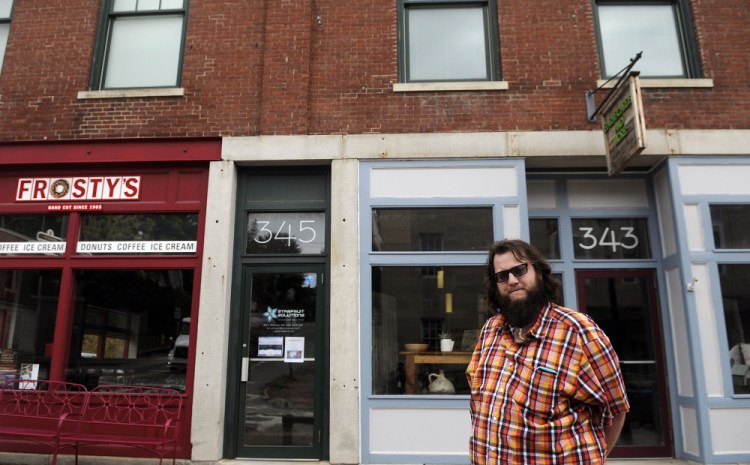GARDINER — For Brad-Lee Nichols, the co-working space he’s opening in this southern Kennebec County city is about making good use of the resources he has at hand.
He operates his company, Starfruit Solutions, from part of the space he has been leasing on the second floor of 345 Water St., since relocating from Newport earlier this year.
The company pulls together professionals from across creative disciplines to provide technical services for business, municipalities and other organizations.
Those services include building websites and apps for both computers and smartphones, and building hardware such as kiosks, one of which Starfruit Solutions has created for its biggest client, Baxter State Park. It’s located at the Appalachian Trail visitors’ center in Monson and provides information about the park’s permit system.
Running a co-working site – providing a work space; internet, print and copying services; snacks; and the opportunity to network – is not a great business to be in to make money, Nichols said.
“We don’t need the space to be filled to pay the bills,” said Nichols, 28.
What he and his co-CEO Shaun Campbell, 28, do need, however, is space where their own employees and contractors can work, and a space that offers workers who are in college or just out of it all the things a co-working space can provide for a minimal cost — in this case, $50 a month.
“We have the space, so we might as well open it up, and we might get some employees out of it,” he said.
It’s not a traditional approach to business or hiring, but Nichols and Campbell aren’t following a traditional path.
“We use a rapid development process, like we would in software development,” he said. They don’t project too far out and the goals are loose. That lets them be flexible enough to shift their resources to what’s profitable and what serves their goal through a continual process of planning and assessing. It is, he said, an artifact of web development processes.
“We plan broad goals, and we don’t get invested in things that don’t work and things that aren’t sustainable,” he said.
For Gardiner, Starfruit Solutions and its projects offer one pathway to the future of work.
“The future of the workplace economy is changing,” said Patrick Wright, executive director of Gardiner Main Street and Gardiner’s economic development coordinator. “I think something like 40 percent of workers in the U.S. are now contract employees.” That means the definition of a workplace is changing, and there is a great deal of flexibility.
“Talent is the new commodity that businesses are looking for, and folks with talent tend to be drawn to that kind of space. That’s the kind of community we’re creating in Gardiner,” Wright said.
Gardiner Main Street has offices in a co-working space at the other end of Water Street, so Wright is familiar with what that type of space offers.
He and Nichols are talking about a reciprocity agreement to handle overflow or greater demand.
“We’re open to the idea,” he said. “We think we can create an environment of flexible workspaces. It’s not a zero-sum game. It will benefit both of us.”
So far that’s been a success, but that’s not the only thing Nichols and Campbell have going right now.
Just about half the space they lease is given over to offices. They have plans to turn the other half into dormitory-style housing for their employees and for those using the co-working space. Housing, he noted, is much more valuable than office space in downtown Gardiner.
But before they get there, other projects are in the works. Next month, they are launching upta.market, an online marketplace platform for producers across New England to use the internet to be able to sell what they make to a wider audience. A share of the revenue from both that site and Starfruit Technologies will fund Community Plus, a nonprofit organization that provides, among other things, assistance to the poor and financially distressed people of New England.
At its core, he said, it’s economic development. By giving producers a larger potential audience, they expect as demand increases, those producers will be able to hire and train people to help meet that greater demand. The company also will collect data on what’s in demand, and it can use that to start its own manufacturing operation.
Much of what drives Nichols and Campbell is their need to work on their own terms. Both of them have disabilities, making working in a structured work environment difficult. They needed flexibility and they both have a lot to contribute.
“The only thing stopping us is the system that’s now in place,” he said. They want to provide that kind of flexibility for other people.
Nichols, who started receiving a $700 a month disability check when he was younger because he has Scheuermann’s kyphosis, a deformity in his spine, saw that as a pathway to a lifetime of poverty; but he wanted to do more.
“Our tagline is, ‘Say hello to the future,'” he said. “We don’t know what it is right now, but we’re making it.”
Send questions/comments to the editors.



Success. Please wait for the page to reload. If the page does not reload within 5 seconds, please refresh the page.
Enter your email and password to access comments.
Hi, to comment on stories you must . This profile is in addition to your subscription and website login.
Already have a commenting profile? .
Invalid username/password.
Please check your email to confirm and complete your registration.
Only subscribers are eligible to post comments. Please subscribe or login first for digital access. Here’s why.
Use the form below to reset your password. When you've submitted your account email, we will send an email with a reset code.